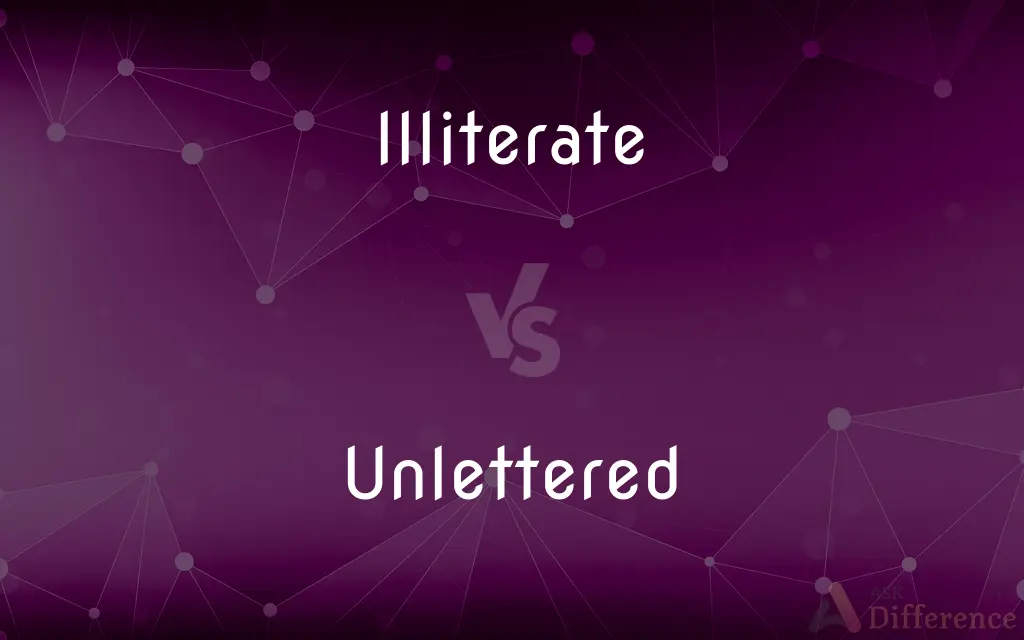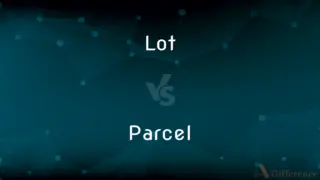Illiterate vs. Unlettered — What's the Difference?
By Tayyaba Rehman & Urooj Arif — Updated on April 3, 2024
Illiterate typically refers to the inability to read or write, while unlettered often implies a lack of formal education or refinement, but not necessarily the inability to read or write.

Difference Between Illiterate and Unlettered
Table of Contents
ADVERTISEMENT
Key Differences
Illiterate is primarily used to describe someone who cannot read or write in any capacity, indicating a specific lack of these fundamental skills. This term is often applied in educational and statistical contexts to categorize individuals based on their literacy capabilities. Whereas unlettered is more frequently used in a broader, sometimes metaphorical sense, to suggest a person's unfamiliarity with literature, culture, or scholarly pursuits, without directly stating that they cannot read or write.
Illiterate directly addresses the abilities related to literacy, focusing on the technical skills of reading and writing. This definition is straightforward and measurable, often used to assess educational needs or achievements within populations. On the other hand, unlettered might imply a wider range of educational or cultural gaps. It is less about the ability to perform the act of reading and writing and more about the level of education or exposure to literature and culture.
Illiterate can have a negative connotation, as literacy is a fundamental skill highly valued across societies. Being labeled as illiterate can imply a need for basic education. While unlettered can also carry a negative connotation, it is sometimes used less harshly, referring to a lack of advanced education or literary knowledge rather than basic educational skills.
Illiterate persons are specifically those who have not had the opportunity to learn reading and writing or have had difficulty acquiring these skills. This term focuses on a clear-cut definition tied to specific abilities. Whereas unlettered individuals might have basic literacy skills but lack formal education or deeper cultural and literary knowledge. The distinction here is less about the ability to read and write and more about the depth of one's education or cultural knowledge.
Illiterate and unlettered both speak to educational levels but in different dimensions. Illiterate is a term with a narrow focus, pinpointing the absence of literacy skills. While unlettered encompasses a broader spectrum of educational and cultural knowledge, suggesting someone may be literate but not well-read or educated in a broader, more cultural sense.
ADVERTISEMENT
Comparison Chart
Definition
Inability to read or write.
Lacking formal education or cultural refinement.
Focus
On basic literacy skills.
On broader educational and cultural knowledge.
Connotation
Negative, emphasizes a lack of fundamental education.
Somewhat negative, suggests a lack of sophistication.
Contextual Use
Educational statistics, literacy programs.
Cultural or literary discussions, informal assessments.
Implication
Lack of opportunity or difficulty in learning.
May have basic literacy but lacks broader knowledge.
Compare with Definitions
Illiterate
Lacking basic literacy skills.
Illiterate individuals face many challenges in today's information-rich society.
Unlettered
Not well-read or cultured.
The unlettered man surprised everyone with his insightful observations.
Illiterate
Not educated in reading and writing.
She volunteers to teach illiterate children in her community.
Unlettered
Without advanced knowledge or education.
Unlettered communities often rely on oral traditions.
Illiterate
Unable to read or write.
The program aims to help illiterate adults achieve basic literacy.
Unlettered
Free from academic or cultural refinement.
She found the unlettered simplicity of the village life charming.
Illiterate
Devoid of the ability to interpret text.
Being illiterate in the digital age is a significant handicap.
Unlettered
Lacking formal education or scholarly knowledge.
Despite being unlettered, he possesses a wealth of practical wisdom.
Illiterate
Without literacy.
Illiterate populations require targeted educational interventions.
Unlettered
Devoid of literary sophistication.
His unlettered approach was refreshingly straightforward.
Illiterate
Unable to read and write.
Unlettered
Not adept at reading and writing; deficient in the knowledge that can be acquired from books.
Illiterate
Having little or no formal education.
Unlettered
Illiterate.
Illiterate
Marked by inferiority to an expected standard of familiarity with language and literature
An illiterate magazine.
Unlettered
Having no lettering
A plain, unlettered T-shirt.
Illiterate
Violating prescribed standards of speech or writing
A paragraph with several illiterate expressions.
Unlettered
Not instructed in letters; not well educated; unable to read
Illiterate
Ignorant of the fundamentals of a given art or branch of knowledge
Musically illiterate. See Usage Note at literate.
Unlettered
Not expressed in or marked with letters
Illiterate
A person who is illiterate.
Unlettered
Having little acquaintance with writing;
Special tutorials to assist the unlettered sector of society
Illiterate
(used with a pl. verb) People who are illiterate, considered as a group.
Unlettered
Lacking general education or knowledge;
An ignorant man
Nescient of contemporary literature
An unlearned group incapable of understanding complex issues
Exhibiting contempt for his unlettered companions
Illiterate
Unable to read and write.
Illiterate
Having less than an expected standard of familiarity with language and literature, or having little formal education.
Illiterate
Not conforming to prescribed standards of speech or writing.
Illiterate
Ignorant in a specified way or about a specified subject.
Economically illiterate, emotionally illiterate
Illiterate
An illiterate person, one either not able to read and write or not knowing how.
Illiterate
A person ignorant about a given subject.
The government is run by business illiterates.
Illiterate
Unable to read or write; ignorant of letters or books; unlettered; uninstructed; uneducated; as, an illiterate man, or people.
Illiterate
A person unable to read
Illiterate
Not able to read or write
Illiterate
Ignorant of the fundamentals of a given art or branch of knowledge;
Ignorant of quantum mechanics
Musically illiterate
Common Curiosities
Is it offensive to use the term illiterate?
The term "illiterate" can be sensitive because it highlights a significant personal and educational deficiency. It's important to use it with understanding and in appropriate contexts.
Can an illiterate person become literate later in life?
Yes, many elder people achieve literacy through dedicated learning programs, personal effort, and support systems.
Does being unlettered affect a person's intelligence?
Being unlettered does not reflect on a person's intelligence; it merely indicates a lack of formal education or exposure to literature and culture.
How do societies address illiteracy?
Societies address illiteracy through educational programs, literacy campaigns, and providing access to schooling for all age groups.
How can unlettered individuals gain cultural knowledge?
Unlettered individuals can gain cultural knowledge through experiences, interactions, media, and self-directed learning.
Can someone be literate but still considered unlettered?
Yes, a person can have basic reading and writing skills (literate) but may still be considered unlettered if they lack broader educational or cultural knowledge.
What resources help improve literacy for illiterate people?
Resources include adult education centers, online learning platforms, libraries, and community literacy programs.
How does literacy impact personal development?
Literacy significantly impacts personal development, enhancing communication skills, self-esteem, and access to information.
Are literacy rates improving globally?
Yes, global literacy rates have been improving, thanks to increased educational initiatives and access to schooling.
What challenges do illiterate people face in society?
Illiterate people face challenges in employment, accessing information, and participating fully in society.
Can digital platforms help reduce illiteracy?
Digital platforms offer new opportunities for learning and literacy improvement, making education more accessible to diverse populations.
Is there a correlation between literacy and economic development?
Higher literacy rates are strongly correlated with economic development, as they enable a more knowledgeable and skilled workforce.
Can someone be considered unlettered in a digital context?
Yes, in a digital context, someone might be considered unlettered if they lack knowledge of digital literacy or cultural content online.
How do cultural perceptions of literacy and education differ globally?
Cultural perceptions vary widely, with some cultures placing high value on formal education and literacy, while others may prioritize practical knowledge or skills.
What role do governments play in addressing illiteracy?
Governments play a crucial role through funding education, implementing literacy programs, and ensuring access to schooling for all citizens.
Share Your Discovery

Previous Comparison
Intelligent vs. Clever
Next Comparison
Lot vs. ParcelAuthor Spotlight
Written by
Tayyaba RehmanTayyaba Rehman is a distinguished writer, currently serving as a primary contributor to askdifference.com. As a researcher in semantics and etymology, Tayyaba's passion for the complexity of languages and their distinctions has found a perfect home on the platform. Tayyaba delves into the intricacies of language, distinguishing between commonly confused words and phrases, thereby providing clarity for readers worldwide.
Co-written by
Urooj ArifUrooj is a skilled content writer at Ask Difference, known for her exceptional ability to simplify complex topics into engaging and informative content. With a passion for research and a flair for clear, concise writing, she consistently delivers articles that resonate with our diverse audience.
















































